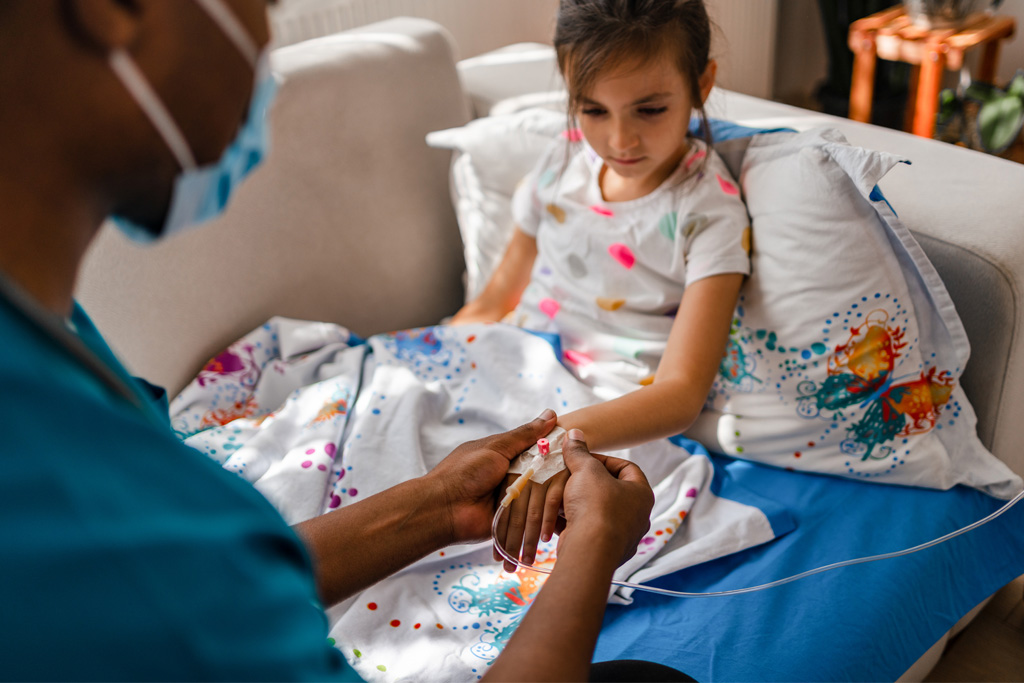What Nurses Need to Know About Acute Hospital Care at Home Programs

Long ago, house calls were a common practice in healthcare. Now, as the population grows older treating patients in their homes is again becoming an increasingly common care model. In Acute Hospital Care at Home (AHCaH) programs, patients requiring acute care remain in their homes for treatment as opposed to being admitted to the hospital.
The nursing profession and Bachelor of Science in Nursing degree programs in Ohio and elsewhere are responding to this important evolution in patient care.
What is Acute Hospital Care at Home (AHCaH)
In the AHCaH model, patients requiring acute care are cared for by a team of healthcare professionals who either visit the patient in their home or connect with them via telehealth.
AHCaH was first introduced in the 1990s at The Johns Hopkins Hospital in Baltimore, but didn’t gain wide adoption until the Centers for Medicare & Medicaid Services (CMS) began providing waivers for AHCaH programs as part of its strategy to increase hospital capacity during the COVID-19 pandemic.
Post-pandemic, CMS has extended the AHCaH waivers, which means that Medicare and Medicaid will continue to cover patients in these programs. This extension also has opened the door for additional healthcare organizations to launch AHCaH programs to provide home-based acute care.
As these programs are specifically for patients in need of acute care, they do not address the needs of patients requiring long-term care, such as that provided through in-home health services or by nursing homes or other residential care facilities.
Research points to multiple positive outcomes for AHCaH patients including an improved mental state, significant reductions in inpatient-induced delirium, fewer complications from inactivity, and lower 30-day readmission rates.
The Role of Nurses in Acute Hospital Care at Home
An AHCaH team can incorporate multiple healthcare professionals, including paramedics, physical, occupational or speech therapists, social workers, phlebotomists, patient care assistants, and others.
Just as with inpatient acute care, nurses are critical to the success of AHCaH engagements. As American Nurse Journal points out, many of these programs also include multiple nursing roles, each of which have multiple duties, including the following:
- Market Recovery Care Coordinators – program marketing, admission screening, arranging transportation, coordinating delivery of medication, equipment, and supplies.
- Acute Care Registered Nurses – making virtual or daily in-person visits, performing home safety assessments, identifying care barriers and making recommendations, setting up equipment, facilitating escalation of care.
- Nurse Practitioners – conducting daily in-person or virtual visits, managing prescriptions, communicating the treatment plan to the team, facilitating adjustments to treatment plans, consulting with specialists.
- Virtual Care Unit Coordinators – providing virtual support to other team members, coordinating pickup and delivery of medications and equipment, coordinating transportation during care escalations.
Nurses in these roles need knowledge and skills that are specifically suited to providing home-based care. These include exceptional communication skills, technology skills, and the skills needed to conduct assessments, coordinate care, and successfully collaborate with a remote interprofessional team.
Bachelor of Science in Nursing programs in Ohio and elsewhere are incorporating the development of this knowledge and these skillsets into their curricula to prepare nurses for the demands of their evolving profession.
These degree programs are recognizing that the future of nursing may be less about working in hospitals, doctors’ offices, or other healthcare facilities, and more about caring for patients where they will be most comfortable and are likely to realize the best outcomes in their homes.
Nursing at John Carroll University
John Carroll University’s Bachelor of Science in Nursing, launched in collaboration with Cleveland’s world-class medical institutions (Cleveland Clinic, University Hospitals, and the MetroHealth System), will begin enrolling students for the Fall 2023 semester. Through the BSN program, new teaching and simulation facilities in the Dolan Center for Science and Technology will support a forward-looking, evidence-based approach to nursing education.
JCU is a private Jesuit university located in University Heights, Ohio, near Cleveland.
